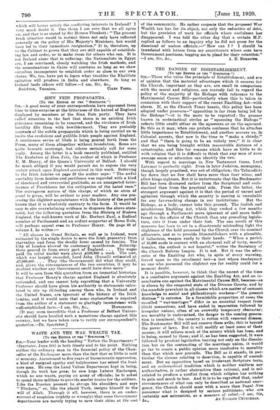SINN FEIN PROPAGANDA. .
[To THE EDITOR OF THE " SPECTATOR.") Sat,—A good many of your correspondents have expressed from time to time surprise at the bitterness of the hatred of England displayed by members of the Sian Fein party. They have called attention to the fact that them is no existing Irish grievance remaining to be removed, and the virulence of Irish hostility fills them with bewilderment They are probably unaware of the subtle propaganda which is being carried on to incite the credulous and gullible Irish -people against England. A continuous series of libels is being poured forth from the Press, many of them altogether without foundation. Some are quite beneath oontem,pt, but others certainly call for some reply. Among the latter is a book recently published, entitled The Evolution of Sinn Fein, the author of which is Professor II. M. Henry, of the Queen's University of Belfast. I should be much obliged if you would permit me to expose the very unfair attack upon England contained in this work. Referring to the Irish famine on page 29 the author says: " The awful mortality from famine and pestilence was regarded with a kind of chastened and reverential gratitude, as an unexpected inter- ference of Providence for the extirpation of the hated race." The outrageous nature of this charge, of which 210 atom of proof is given, will be evident to your readers. Any one pos- sessing the slightest acquaintance with the history of the period knows that it is absolutely contrary -to the facts. It would be easy to cite overwhelming evidence to disprove the above state- ment, but the following quotation from the History of Modern England, the well-known work of Mr. Herbert Paul, a Radical member of Parliament and an ardent supporter of Home Rule, will perhaps appeal even to Professor Henry. On page 60 of volume I. he writes:— " All classes in Great Britain, as well as in Ireland, were animated by the single desire to save the Irish peasantry from starvation and from the deadly fever caused by famine. The City of London showed its customary munificence. Subscrip- tions poured in from every part of England. . . . The wages paid (in relief works) were about £160,000 a week. The cost, which was largely exceeded, Lord John (Russell) estimated at £7,000,000. . . . They (the Government) did what they could, and, given the circumstances of the two countries, it may be doubted whether any Government could have done more." It will be seen from this quotation from an impartial historian that Professor Henry's charge against England is absolutely unfounded, and one cannot help regretting that a University l'rofessor should have given his authority to statements calcu- lated to stir up ill-feeling among those who, in Ireland and the. United States, are ignorant of the history of the Irish famine, and it would seem that some explanation is required from the author of a statement so glaringly inconsistent with
well-established facts.—I am, Sir, &c., Hisroincus.
[It may seem incredible that a Professor of Belfast Univer- sity should have levelled such a monstrous charge against this country, but we have taken care to verify our correspondent's quotation.—En. Spectator.]






































 Previous page
Previous page